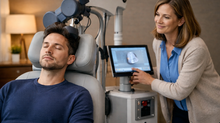“THERE AINT NO CURE FOR THE SUMMERTIME BLUES” -The Who (Or is there?)
- Dr. Gary Warstadt
- Jun 1, 2023
- 2 min read

The temperatures are climbing, the days are getting longer, and the cold dark days of winter are a fading memory. For most of us, the approach of summer is a source of happy anticipation. But for some, it is a source of despair.
Most people who have an annual rhythm to their depression develop depressed in the fall and winter, during the time of the shortest days. We call this seasonal affective disorder (SAD), but there is a small subset of people who have the reverse pattern. They get depressed in the summer. This has been variously called "reverse SAD" or “summer SAD”.
The winter variety has been linked in a very scientific manner to the shortened length of day and decreased sunlight. Whether this summer variety is likewise directly linked is more controversial, there is not much research into this. In general, there is not much research into the summer phenomenon.
Typically, people with seasonal affective disorder sleep too much and eat too much as well as crave carbohydrates. People with the reverse syndrome often exhibit the reverse symptoms: loss of sleep and appetite.
There is speculation that perhaps temperature and humidity can trigger depression and some people, and there have been some reports of people who have been treated with air conditioning and cold showers. Others speculate that allergies may play a role.
Aside from these more physiological triggers, there may be some psychological triggers. Some people who are uncomfortable about their appearance can become quite distressed at the thought of wearing short-sleeved shirts or shorts, and therefore exposing more of their bodies. Some go beyond that into the realm of what is called "body dysmorphic disorder" where they are extremely negatively preoccupied with their appearance. People who have self harmed in the past often have scars on their extremities which they fear will telegraph to outside observers that something must be psychologically wrong with this individual. The alternative for these folks, wearing a long sleeve shirts and long pants on 90 degree days carries its own obvious negative consequences.
There is certainly a substantial number of people who have what is known as "anniversary reactions." These are people who have had bad events or losses, often multiple losses during a particular time of year or month. Every year as that anniversary time comes around, and often for weeks beforehand, they experience dread and distress. Although this is not by any means limited to summer months, obviously these anniversaries can occur during the summer which might result in it being mistaken for reverse SAD.
Lastly, there are people who have some annual external event that can trigger depression. It is commonly seen among teachers and other educators, especially those with more issues around their jobs, who are off all summer, must go back to work at the end of August and therefore become depressed around that time.
The use of air conditioners and/or room darkening shades has been proposed but not well studied. Beyond that, the same range of treatments that are employed for nonseasonal depression appear to be effective for summer SAD: Cognitive behavioral therapy, other forms of psychotherapy, and antidepressant medications. TMS has not been specifically studied for this condition, but it is reasonable to expect that it would work as well as it does for any other form of depression i.e. very effectively.













































Comments